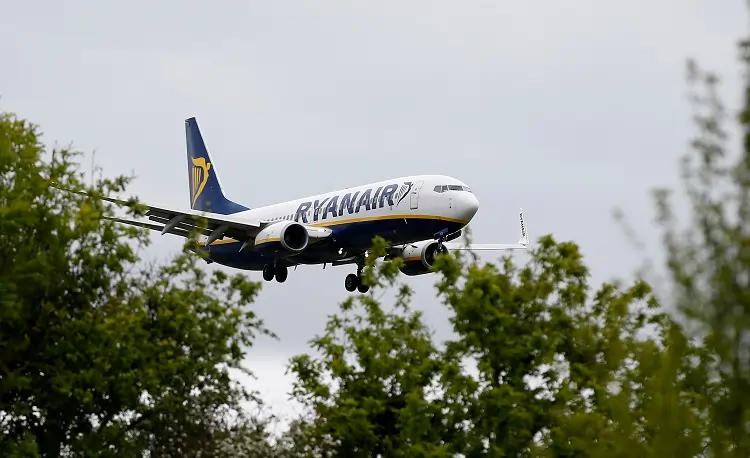
By Conor Humphries
DUBLIN (Reuters) -Budget airline Ryanair said on Monday that average fares fell 10% in the six months ended September, leading to an 18% year-on-year fall in first-half profit, but its current quarter bookings looked strong and ticket price weakness was moderating.
After-tax profit for the first half of Ryanair’s financial year was 1.79 billion euros ($1.95 billion), just short of the 1.8 billion euro profit forecast in a company poll of analysts.
But the Irish airline, Europe’s largest low-cost carrier, said average fares in the current quarter would be only “modestly lower” than the same period last year.
Chief Financial Officer Neil Sorahan told Reuters that fare declines in the current quarter ending in December would likely be below 5%. “Things appear to be strong” in the quarter, he said.
Ryanair said it would trim its passenger growth target for its next financial year, which ends on March 31, 2026, to 210 million passengers from 215 million to reflect delivery delays from Boeing.
That is based on the assumption that Boeing delivers 15 of 30 737 MAX aircraft that were due to arrive by next summer, but “there is a high risk around that number” due to the Boeing strike, Sorahan said.
Boeing shares gained 3.5% on Friday on bets that the planemaker’s U.S. West Coast factory workers will approve a new wage offer and end a seven-week strike that has halted jet production and hammered the company’s finances.
Ryanair on Monday declined to provide a forecast for its profit for the current year, but Sorahan said it was safe to assume that profits would be down on last year.
He also declined to give a forecast for profits next year, but said he was hopeful that constrained market capacity and lower interest rates would lead to a better environment for ticket prices.
Shares in the airline, Europe’s largest by passenger numbers, ended Friday at 18.02 euros, down 5.5% year to date.
The share price dropped as low as 13.41 euros in July after it reported profits had almost halved in the three months to the end of June, but recovered on more positive commentary about late summer fares.
(Reporting by Conor Humphries; Editing by Himani Sarkar and Jamie Freed)


